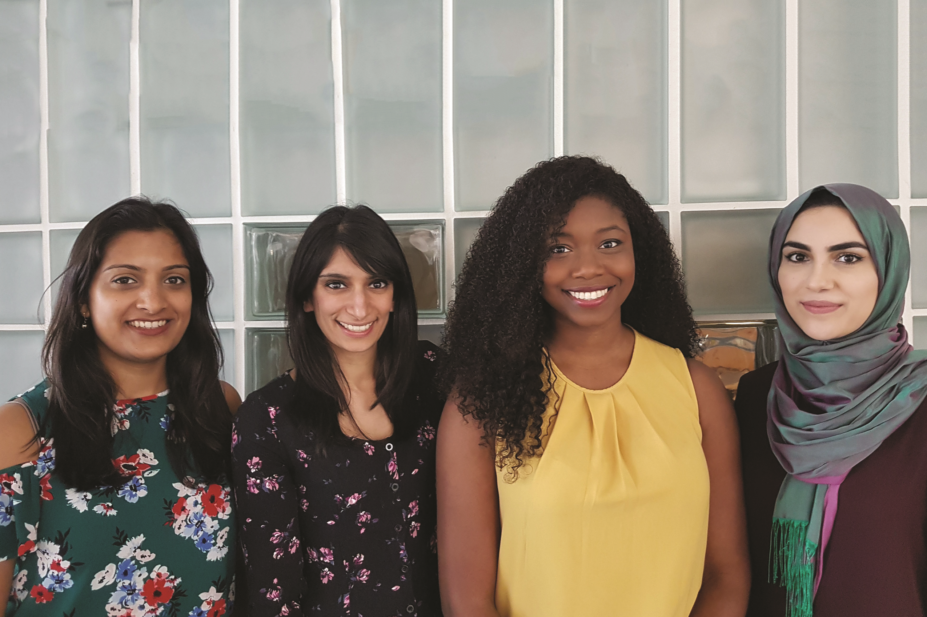
Naz Kanani Alviri
Whittington Health have piloted a six month pharmacist medication administration and phlebotomy service to help address chronic nursing shortages. Here Naz Kanani Alviri, Raakhi Mehta, Chandni Khanderia and Cynthia Mbulu describe their experience.
In October 2016, pharmacists at Whittington Health were offered the unique opportunity to be part of a pilot project. This would be in an effort to aid with the chronic nursing shortages, reduce the cost of agency nurse recruitment and increase patient safety on the wards.
The project was to be run on the largest medical and surgical wards in the hospital for a period of 6 months.
Our main role was to administer medications (including intravenous, subcutaneous, intramuscular routes); and to take blood and insert cannulas. This was, of course, a very new way of working compared to a usual hospital pharmacist role and to say the least, there were mixed feelings. Some were eager to jump at this opportunity whilst others, more hesitant and unsure. Eventually, we volunteered to become the new “Pioneer Pharmacists”.
Responsibilities
During the administration rounds, we ensured that patients, as well as nurses, knew what each medication was for and that they understood when and how to take the medicines. This increased patients’ confidence in taking medications and in turn, their adherence.
Being directly involved with medicines administration enabled us to improve their management on the ward and assist with discharge planning. For example, ensuring sufficient supply either at home or on the ward to both reduce medicines wastage and allow for a smoother discharge
Our practical skills in phlebotomy and cannulation enabled blood results to be obtained sooner, which especially aided with therapeutic drug monitoring. Also, being more involved with antimicrobial stewardship such as reviewing antibiotics, recommending switching from intravenous to oral, and stopping or de-escalating antibiotic courses.
Typical Day
- 7:30 – Attend morning handover. Advise nurses on medication queries and order medicines in advance from pharmacy.
- 8:00 – Morning medication round. Formulation issues can be resolved for those with swallowing difficulties through referral to Speech and Language Therapy or by advising nurses on alternative administration methods.
- 10:00 – Carry out observations, such as measuring the heart rate and advising on anti-hypertensive doses. Ensure pre-11am discharges, and district nurse referrals for patients requiring medicines administration are completed. On the weekends, take bloods from patients, and complete any outstanding drug histories.
- 12:00 – Noon medication round. If intravenous antibiotics/fluids are to be continued then we would re-cannulate patients and feed patients at risk of aspiration at lunch if needed.
- 14:00 – Afternoon medication round and measure blood glucose levels. Advise nurses on any medication administration queries, especially regarding intravenous medicines.
- 15:00 – Update patient medical notes and ensure the plans documented for the day have been done. Then, carry out remaining discharges.
- 18:00 – Evening medication round. Guide nurses on where to find any non-stock medicines newly prescribed for the evening. Also, contact the on-call doctor if there are any medication issues.
- 19:30 – 20:00 – Evening handover
New appreciation
Throughout this unique experience, we all enjoyed the increased patient contact and being able to assist patients on a different level. We also appreciated the opportunity to utilise new clinical and practical skills that we would otherwise never have learnt in our traditional role. The project gave us a new perspective to the roles of nurses and doctors, and how we, both as Pioneer Pharmacists and as members of the pharmacy department, could better support the ward and multidisciplinary team.
Furthermore, we had more time to counsel patients and their relatives/carers with regards to any medication changes or additions. This was positively received as it helped to improve the patient’s experience overall and add value to the care we provided, which was very rewarding.
Ward integration
As the case with all pilots, there were challenges. This pilot was a completely novel idea to the hospital and thus, most healthcare professionals, including us Pioneers, did not quite understand what our role entailed and where we fitted into the multidisciplinary team.
Moving forward
Overall, we have come to find that becoming the link between pharmacy and the multidisciplinary team helped ensure a smoother patient flow and quicker resolution of medication issues. The experience has given us a different view on medicines optimisation and adherence issues, and a greater empathy towards both patients and staff. Upon reflection, we feel professionally privileged to have been part of such a dynamic and innovative project; building new relationships with the team and gaining a deeper appreciation of working on a busy ward, especially during one of the most challenging times for the NHS. We look forward to seeing how this experience will influence the training process for the next generation of pharmacists and our future practice in an ever-developing health service.
Special thanks to: Patricia McCormick, Anja Richter, Dr Helen Taylor and Professor Ian Bates. An additional thanks to Mita Shah for being the fifth pioneer in this project.
Naz Kanani Alviri, Chandni Khanderia and Raakhi Mehta are rotational pharmacists at Whittington Hospital. Cynthia Mbulu is now a pharmacist at the Royal National Orthopaedic Hospital, Stanmore.


